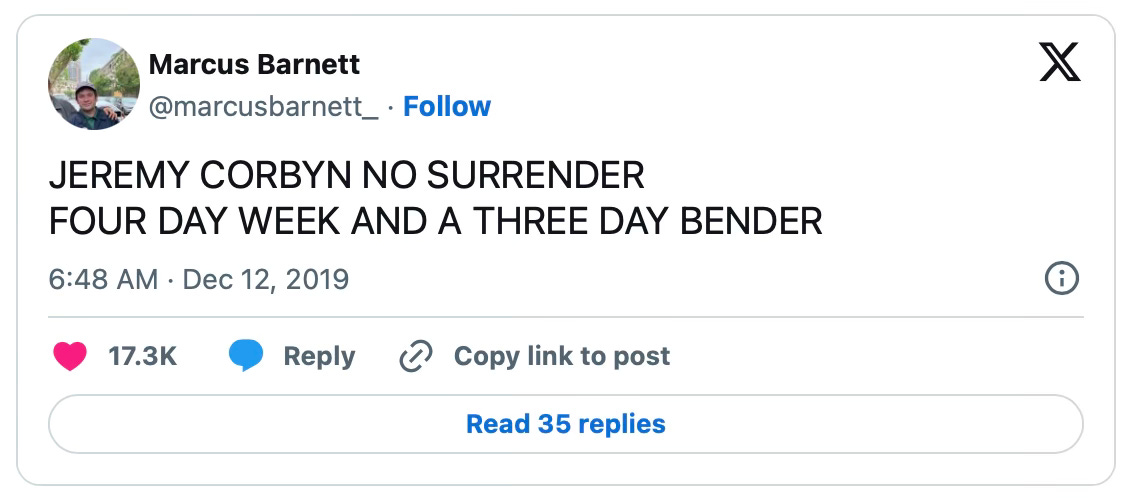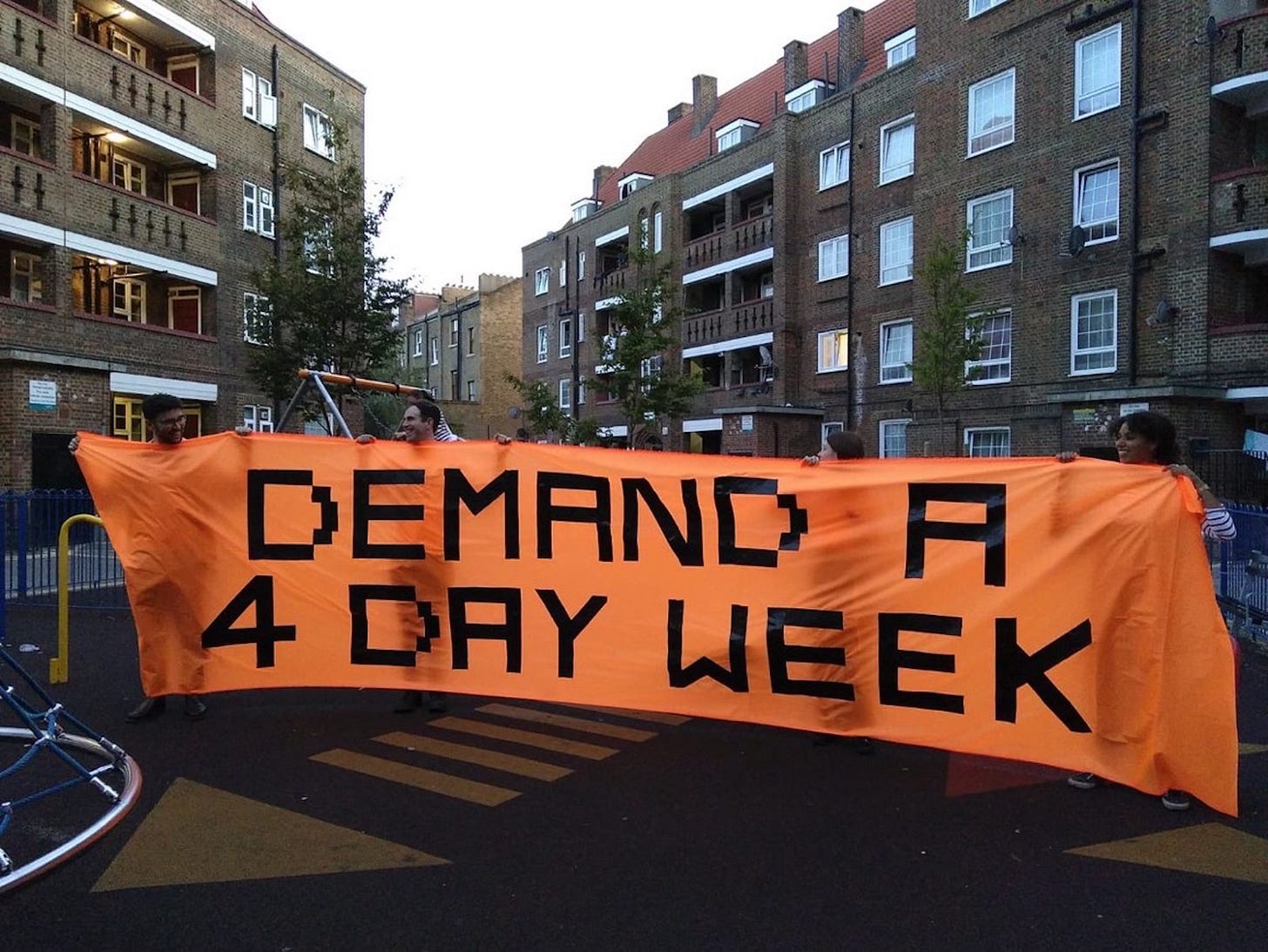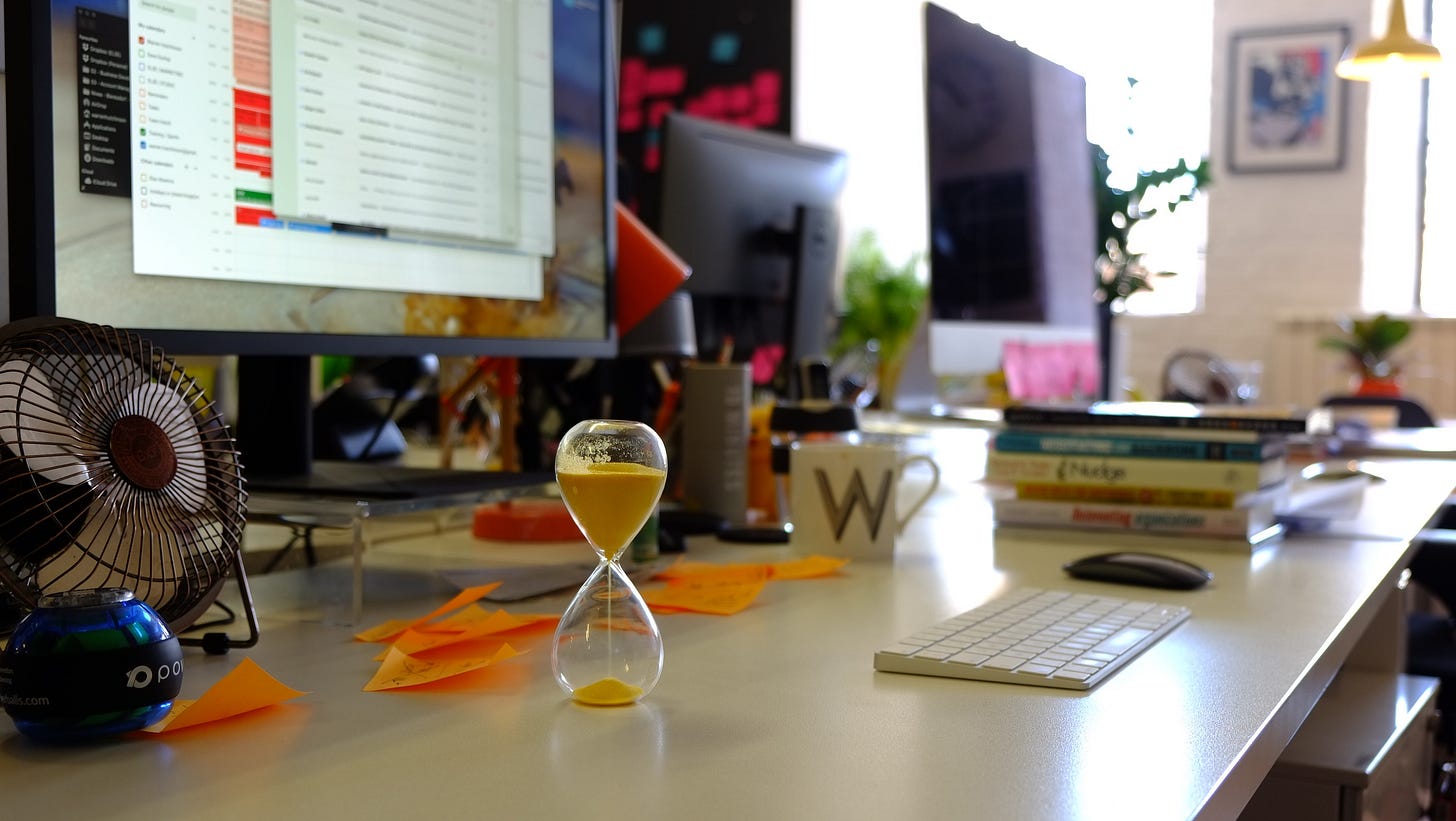How 4-day week workers spend their fifth day
Surprise: they use it for good things
University of Birmingham researchers Daniel Wheatley, Mengyi Xu, Tony Dobbins, Holly Birkett have been interviewing people at 4-day companies about what they’re doing with their new free time. Early in the movement, I think there was a sense that people might not use their time very… constructively, as per this old tweet:
Wheatley et al recently previewed their research at the British Sociological Association conference, and there was no mention of three-day benders:
Drawing on qualitative interviews with stakeholders at 20 UK SMEs in 2024, this study examines an important unanswered question: how is the “fifth day” utilized, and does its use matter for individual and organizational outcomes? Applying longstanding debates around autonomy and organizational control to the four-day week, we explore how employer concerns about moonlighting and malfeasance come into tension with employee preferences for control over their time and freedom to pursue activities that support career development, work–life balance, and well-being.
We find a wide range of uses for the fifth day, from leisure time that enhances work recovery, to easing caring responsibilities, to education and training for personal and professional development, to civic engagement (whether employer-linked or not), and, more controversially, side hustles. The impacts are equally diverse, reflecting individual and organizational nuances and a mix of benefits, challenges, and risks.
Wheatley says, “In addition to using the time for leisure, chores, caring responsibilities, and engaging in education or community and voluntary work, several interviewees reported engaging in side hustles and other paid employment during their fifth day…. Tensions were present in a small number of instances, with employer representatives and leaders reflecting on the risk their staff’s main job suffers due to work overload.”
One manager they interviewed said, “People will start their own business with the extra time. They’ll start their own social media channel – that is fine as long as it doesn’t affect your work. But the data shows that when people have too much going on, their work does suffer in general.”
This question of side gigs and fatigue one that my clients will occasionally bring up.
Usually I tell them, if they weren’t concerned about how many hours a night people slept or what hobbies they had before the 4-day week, they shouldn’t feel the need to intervene now. (The one exception was someone working for a general contractor was spending his free day launching his own contracting company. They worked out a non-compete clause, but that was the only case I’ve come across of someone taking on additional work that actually competes with their day job.)
Further, as leaders you’re always making judgments about how to respond when employees are fatigued. The person who’s exhausted from having a new baby or spending time with a parent in hospice will be treated different the person who’s out all night clubbing.
This Birmingham project broadly tracks I found when researching my book Shorter: people in my (!) organizations likewise engaged in the same mix of hobbies, life admin, professional development, side hustles, etc. (I had a whole section called “How People Spend Their Free Time.”)
[S]ome people take on side gigs. In Edinburgh, Administrate scrum master (and former rugby player) Iain Brown is becoming a personal trainer. In Sydney, Insured by Us people and culture head Georgina Robilliard and a friend run a catering business called the Cheese Pair, while Kester Black’s graphic designer does freelance work to build her portfolio and aims to launch her own studio. Given that Ross started Kester Black in her bedroom while working another job, she sees the ability to do those kinds of side projects as “a great freedom to pass on to my staff.”…
In almost every company that moves to shorter hours, people say they exercise more, feel better and healthier. At Pursuit Marketing, Sam Werngren has organized Friday walks on Munros, Scottish mountains that are over 3,000 feet tall. “If folk had to give up their Saturday for that, it’d be a lot harder to get any kind of team cohesion,” he says, but “on a Friday it’s a lot easier to get buy-in from the team, and to become pals outside of work as well as inside work.” Henrik Stenmann says that since IIH Nordic moved to a four-day week, “I’ve lost ten kilograms because I’ve had time for exercise again. I’m more fresh and open, not so tired in the evening.” With more energy and stamina, he marvels, “I work less, but I get more done. That sounds crazy, but it’s true.”
More exercise can also mean more time for new thinking. A number of founders have taken up running or cycling, because it provides time for reflection or mind-wandering. “I do my best work when I’m on the bike,” Jonathan Elliot tells me. On the roads around Hobart, “you’re in a meditative space, you’ve got the endorphins going,” and during long rides he often finds answers to problems that eluded solution in the office. The day before we spoke, he says, “I resolved some things and came up with some bright ideas” during a two-hour ride. “If I was sitting in an office behind a computer, I wouldn’t have done that.”
My favorite account of how people spent their free time came from Normally, a design research consultancy in London:
At Normally, having a four-day week gives people more time to look after themselves and others, which makes everyone better off. “I think that our four-day week makes us a much smaller burden on social services,” Chris Downs says. “We require less National Health, because we are able to look after our mental and physical well-being.” Employees spend less on childcare and can spend more time with elderly parents.
Indeed, for most of Normally, free time “is about taking care of someone,” Marei Wollersberger says. “That someone can be yourself, and your own health and well-being. It can be children. It can be a parent who gets ill, and the person wants to spend more time with them.”
“Absolutely,” Chris agrees. “So yeah, if you summarize what people do with their fifth day? They care.”





